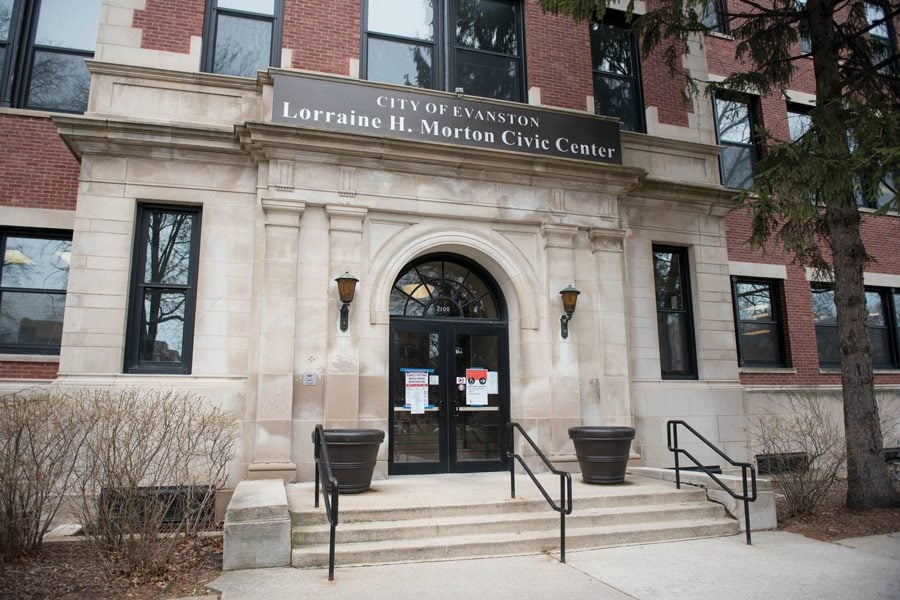Residents say budget survey endangers programs helping underprivileged communities
Daily file photo by Katie Pach
Lorraine H. Morton Civic Center, 2100 Ridge Ave. Community members spoke during Monday’s City Council meeting about their concerns for the priority-based budgeting survey.
May 22, 2018
Community members at a City Council meeting Monday voiced their frustration over the priority-based budgeting survey and advocated for programs affecting underprivileged communities in Evanston.
The city released the survey on May 10, asking residents to rank their top 10 and bottom 10 budgeting priorities using a list of 46 items. Residents spoke out against the survey during public comment, highlighting items vulnerable to cuts such as the Mayor’s Summer Youth Employment Program — which provides work opportunities for young people ages 14 to 18 — and the Mental Health Board, which provides funding for organizations addressing wellness.
Alyce Barry, a board member of Organization for Positive Action and Leadership — an Evanston nonprofit focused on civic engagement and equity — said during public comment that some people lead “privileged” lives in Evanston and do not know the implications of cutting some programs, which she said could have an “enormous” impact on lower-income residents.
“Are we really a city in which youth programs and mental health are no more important than tree trimming and Divvy bikes?” Barry said. “Equity is everybody getting what they need. It’s not everybody getting what they’d like even if it’s at the expense of others.”
Barry said her biggest concern was the way the survey put all programs on equal footing. She said the city should be clearer about who benefits from each program.
Bobby Burns, co-founder of Evanston Collective, told The Daily that the survey did not offer enough information about how resources are allocated, only providing the total cost of each program. For example, when looking at the summer youth programs, he questioned how much of that money goes to staff, resources or other administrative costs.
“(The survey is) incomplete,” Burns said. “The risk we’re taking is if people truly don’t know the details of the program, people will just … start cutting the most expensive programs first. I don’t think we have enough information to have a discussion about each of these programs.”
Burns said he is concerned that summer youth programs and storefront modernization projects made the list for possible cuts. He spoke to “historical disinvestment” in the 5th Ward and the 8th Ward and said these programs were designed for underserved communities.
However, Burns emphasized that the survey is the first step of a long budgeting process for the city. He said he was pleased the city started the process early, as it gives citizens more of a chance to get involved in the discussion.
Evanston resident Robin Robinson also spoke at the council meeting and told The Daily that the survey was “obnoxious” and “infuriating.”
Robinson now has eight grandchildren in Evanston, and she said she wants programs like the Mayor’s Summer Youth Employment Program and the Summer Food Program — which offers free breakfasts and lunches for children in need — to be available for them and their peers.
“It is imperative we have something in place where not only my grandchildren, but the younger children of the community have something to look forward to, something to hold onto, something to give them hope,” Robinson said.
Robinson described her own experience with the Certificate of Rehabilitation Program, a program on the survey that currently helps people get their criminal records expunged. She said the program “opened doors that were closed” for her, allowing her to avoid the stigma of a criminal record when looking for a job or purchasing a house. Though she said those days are behind her, other people still benefit from the program.
Robinson, a person of color, explicitly pointed out the racial implications of cutting certain programs: Most white residents would not be affected, she said, but black residents would be devastated. She said this spoke to the amount of white privilege in Evanston.
“When you start messing with the children in my community and the elderly, I have a problem with that,” Robinson said. “It just infuriates me. I get really emotional. … I don’t bite my tongue.”
Email: catherinehenderson2021@u.northwestern.edu
Twitter: @caity_henderson



